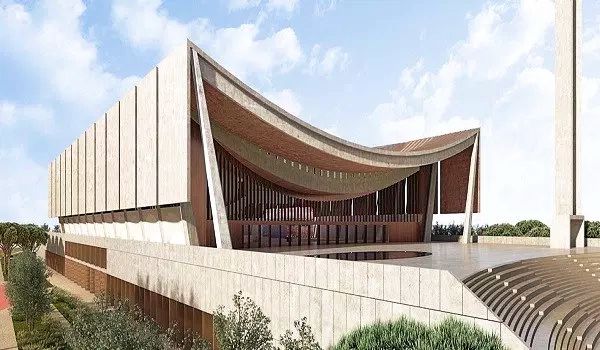On January 23, 2019, the Supreme Court in a unanimous decision dismissed a case filed by James Kwabena Bomfeh Jr challenging the constitutionality of the government’s involvement in the cathedral project and the operations of Hajj.
Justifying its decision, the court, in a 22-page judgement, held that while the case did not raise any question of constitutional interpretation, it presented an issue of constitutional enforcement.
However, the evidence presented by the plaintiff could not substantiate his claim that the Constitution had been breached.
This article carefully examines the judgement of the Supreme Court in plain English, devoid of legal jargon, and its implications for State-religion relations in Ghana.
Ghana is a secular state and religiously pluralistic
James Bomfeh Jr had argued that Ghana was a secular republic and religiously pluralistic.
In his view, this requires the State to treat all religions equally, remain indifferent to religion or show balance in treating all belief systems. In particular, the State should not get excessively entangled in religion.
In response, the Attorney General agreed with the plaintiff that Ghana was a secular State but disagreed with the principle of equal treatment of all religions.
She maintained that the mere provision of land for the construction of the cathedral, and the consular and diplomatic support extended to Muslims going on the Hajj, did not amount to excessive State entanglement in religion.
Decision of the Supreme Court
The Supreme Court did not accept the view that equality of religions was protected by the Constitution.
What the Constitution prohibits is discrimination on the basis of religion or the State hindering persons in the practice of their religions.
The court further decided that the extent of the government’s involvement in the cathedral project and Hajj did not amount to unconstitutional entanglement of the State in religion.
Instead, the construction of the cathedral will promote national cohesion. The court did not explain how this is to be achieved.
Known facts about the cathedral
James Bomfeh Jr relied on these undisputed facts in support of his case. (1) The idea for construction of the cathedral to serve as “Ghana’s Mother Church” was mooted by H.E the President; (2) the Minister of Lands has described the cathedral as “a National Cathedral for the State of Ghana”; (3) the government has allocated 6.323 Ha of State land free of charge for the construction of the cathedral; (4) the cathedral has been described as a “legacy project” to commemorate the 60th anniversary of Ghana’s independence; (5) the President set up a Board of Trustees with offices at the Jubilee House to coordinate the construction of the cathedral; (6) the President cut the sod for the construction of the cathedral as part of the programmes for the 60th anniversary celebrations of Ghana’s independence and further unveiled the architectural designs of the cathedral during the 61st anniversary celebrations of Ghana’s independence.
Again, (8) the cathedral is to be used, among other things, for “presidential inaugurations”; (9) the government seeks to demolish State and private buildings, including bungalows of Superior Court judges to make way for the construction of the cathedral; and (10) in the government’s Budget Statement read in Parliament on November 16, 2018, public funds (seed money) were allocated for the construction of the cathedral.
It is surprising that the only pieces of evidence the court expressly addressed in respect of State entanglement in the cathedral project were the provision of land for the cathedral and the location of the office of the Board of Trustees for the cathedral at the Jubilee House, which the court said could be relocated.
Government involvement in Hajj
The extent of government involvement in Hajj is a divisive issue among Ghanaian Muslims. In its reply submissions, the Attorney General waxed Quranic, citing Quran 3.97, and firmly concluding that it was “not allowed in Islam for the State to pay for pilgrims to go on the Hajj with taxpayers’ money, this would certainly amount to entanglement…” Contrary to this claim, the Chairman of the Hajj Board, Sheikh IC Quaye, has been reported as saying “the actual fare [for the 2018 Hajj] is GH¢ 19,500, but the government has absorbed GH¢ 4,500 of the cost to enable more pilgrims to perform the Hajj”.
Although this piece of evidence was brought to the attention of the Supreme Court, the court failed to assess its relevance in answering the question whether the extent of government involvement in Hajj amounted to an unconstitutional entanglement in religion.
Minority religions to make requests for government support
In its judgement, the Supreme Court refers to minority rights but notes that “nowhere in his brief has Plaintiff alleged a request by any specified religious group for any form of assistance which has been denied by the State”.
The reference to minority rights is hugely significant. In human rights law, two principles undergird minority rights - the principle of non-discrimination against minorities and the implementation of special measures to safeguard the interests of minorities.
Is the court suggesting that requests by minority religions for equal treatment cannot be denied by the State?
Conclusion
There are apparent difficulties with the reasoning of our Supreme Court.
These include the implied assertion that other religions could make requests for government support when no such requests were made by Muslims and Christians for government involvement in Hajj and the construction of the cathedral.
Beyond this, the court did not find any issue of constitutional interpretation yet decided that excessive entanglement in religion was a benchmark for assessing the constitutionality of government support for religions.
Equally problematic is the court’s unsubstantiated claim that the building of the cathedral will promote national cohesion.
Whether the State is in a position to accommodate requests for support from all belief systems in a fair and non-discriminatory manner without getting excessively entangled in religion is surely a question our courts may have to answer one day.
The writer is a lecturer at the School of Law, University of Ghana.

